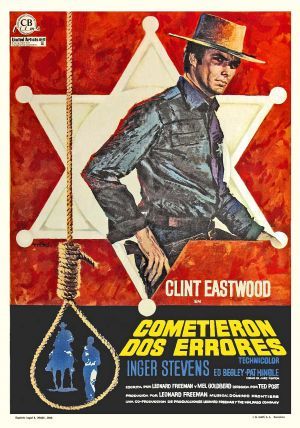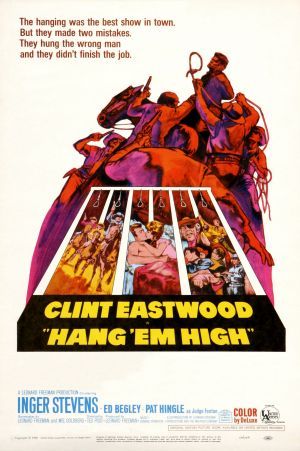
Director Ted Post's "Hang ‘em High" (*** OUT OF ****) qualifies as Clint Eastwood's least appealing western. This United Artists release served as the first Eastwood epic after Sergio Leone's "The Good, the Bad, and the Ugly." Composer Dominic Frontiere's powerful orchestral score ranks as its best asset and enhances the formulaic Leonard Freeman & Mel Goldberg screenplay about western justice, circa 1889. Frontiere composed the scores for television shows such as "The Invaders" and "The Rat Patrol." His score for the Lee Van Cleef western "Barquero" sounds like variations on his "Hang ‘em High" theme. Mind you, Eastwood looks cool as a glacier in his dark blue outfit and flat-brimmed hat, and he kills bad guys who deserve to die without a qualm. Nevertheless, "Hang ‘em High" resembles a tautly made television drama. The surroundings, even the sandy desert scenes, lack the majestic sprawl of his inspired Italian westerns and his later sagebrushers such as "The Outlaw Josey Wales," "The Pale Rider," and "Unforgiven." Clearly, since he hadn't made a strong enough impression on Hollywood, Eastwood had to play it safe with a low-budget. In retrospect, the wily Eastwood surrounded himself with an incredible cast of supporting actors that assumes far greater significant now than back in 1968 when “Hang ‘em High” swung into theaters.
No, "Hang
‘em High" was NOT a Spaghetti western like the Sergio Leone trilogy that
preceded them. Lensed entirely in
Southern California, this thoroughly routine oater springs its one and only surprise
when our hero gets his neck stretched in the first scene. The sly ploy
resembles Hitchcock's "Psycho" in this respect. The last thing that you’d expect is that the
star would be hanged at the outset. Jed
Cooper is a former St. Louis lawman-turned-cattleman wrongly hanged for
rustling who survives the near fatal ordeal. "Hang ‘em High" focuses primarily on
the theme of revenge that figured prominently in most Italian westerns. The lynch mob found our innocent hero after he
had bought cattle from a murdered sixty-something rancher. No matter what Jed says, Captain Wilson and
his nine conspirators refuse to believe him. He provides a fairly detailed description of
the man who sold him the cattle, but this doesn’t dissuade the Captain from his
decision. As it turns out, the dastard who killed the rancher gave Jed (Clint
Eastwood) a forged bill of sale. This is what prompts the villains to see Jed
swing dramatically during the opening credits as the title “Hang ‘em High”
slams into the foreground in blood red letters. Cooper finds himself briefly imprisoned after
a tough-as-nails lawman, Marshal David Bliss (Ben Johnson of "Chism")
cuts him down and takes him back stand trial at Fort Grant before the stern
Judge Adam Fenton.
Judge Fenton
(Pat Hinlge of "The Gauntlet")is a quasi-Judge Roy Bean. He has the
last word on justice, and Hingle delivers a commanding performance. The
villains led by Captain Wilson (an elderly Ed Begley of "Boots
Malone") are an ineffectual lot. They botch hanging Jed Cooper, and he
comes after them with warrants issued by Fenton. As much as Fenton warns Cooper
that he better bring the hanging party in,
Cooper winds up killing several of them. The town where all the action occurs
has another character, Rachel Warren (Inger Stevens of "Five Card Stud"),
who has Fenton's permission to look at all new prisoners. She is searching for the fiends that wronged
her. The romance between Jed and Rachel
is as contrived as most of this weak western. Meanwhile, Jed realizes that
Fenton may be a bigger bastard than he is with his iron-fisted rules about
legality. In his spaghetti westerns, Clint Eastwood bowed to nobody, but his
lawman character here takes orders, something that clashes against the Eastwood
characters in
"Two
Mules for Sister Sara" and "Joe Kidd."
One of the
casting decisions defies logic, specifically Alan Hale Jr. as one of Wilson's
riders who hangs Cooper. The portly Hale had played the beloved Skipper from
"Gilligan's Island," but he had played less lovable roles before
"Hang'em High." Nonetheless, it is jarring to see Hale in such a role.
One of the best casting decisions was
veteran B-movie cowboy star Bob Steele. Bob Steele grew up as the son of the same
B-movie director who helmed numerous John Wayne westerns during the 1930s. Indeed, Steele himself was a B-movie cowboy
who starred in his share of low-budget oaters in the 1930s and afterward. Meanwhile, Bruce Dern makes an excellent
villain. "Hawaii 5-0" actor James MacArthur has a memorable cameo as
the gallows Preacher. Dennis Hooper as
well as a line-up of familiar faces, including L.Q. Jones of "Battle
Cry" and Ned Romero of "Dan August," flesh out "Hang ‘em
High." Not surprisingly, Hooper
plays an insane prisoner called 'The Prophet.' There are no spectacular looking shoot-outs
because Ted Post shoots everything like one of his "Gunsmoke" or
"Rawhide" episodes. The scene
where Jed is riddled with bullets and Rachel has to take care of him adds a
tearjerker text to the story. Happily,
Eastwood would go on to make "Two Mules for Sister Sara" and redeem
himself for this lackluster effort. The neatest touch occurs when they hang a
number of men and one of them loses a boot as they plunge through the trap
doors.
Happily,
Post's next outing with Eastwood would come with the highly superior
"Dirty Harry" sequel "Magnum Force." If you're looking for
a better lynch law western, watch "The Ox-Bow Incident" with Henry Fonda that was made back during World War II.


No comments:
Post a Comment